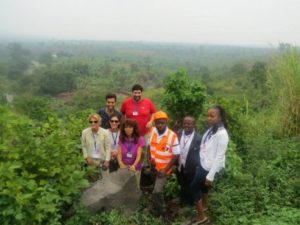Surprisingly, this has been a journey filled with hope and inspiration. I had expected to feel more despair here, surrounded as we are by one of the most devastating humanitarian crises in the world.
This week we spoke with Dr. Namagabe, who works to demobilize and rehabilitate former child soldiers as the director of BVES. He told us that to do the work that he does, and that our other amazing local partners do, one needs a strong heart. I know he is right. While we have been shocked and disheartened by many stories of violence, suffering and tragedy, we also have strong hearts, and we can continue on because of the strength of the children we have met, because of the respect for human dignity and love of country that drives our heroes, and because of the inspiration we receive from the confidence, compassion, commitment, determination and innovation of so many Congolese.
Today we visited Virunga National Park, and the promising Virunga Alliance project. Virunga, a UNESCO World Heritage site, is Africa’s oldest (established in 1925) and most biologically diverse national park. The work being done through the Park Authority here is some of the most innovative work we’ve seen in Congo — at once combining a real commitment to providing trusted security to the civilians here (4 million of them live within a day’s walk of the park) and generating significant investments in local infrastructure, education, and businesses that will bring significant improvements to the quality of life here.
Our first interest in Virunga National Park focused on security. Virunga has been plagued by armed groups since the beginning of the conflict. Those armed groups not only prey on the environment, poaching endangered animals (like the mountain gorillas) and destroying acres of forest to produce charcoal (which, like Congo’s conflict minerals, funds their ongoing wars), but further prey on the population in the region. The Park Rangers underwent a major reform, reducing their troop size from 1000 down to 300 (they now have close to 400 troops — and in the latest round of recruits there are four women). The Rangers have become the only trusted security force in the region — when the M23 rebels blew through the area on their way to storm and seize Goma in 2012, the Rangers helped to evacuate local villages, and it was to the Park Authority’s headquarters that the local population fled, seeking protection.
But Virunga is also the site of Congo’s best hope for sustainable development. The park authority and the two foundations that support it have launched a forward-looking partnership between the local, regional, and national government, civil society, the private sector, and the park to sustainably harness the park’s abundant natural resources for the benefit of the four million people that live within a day’s walk of the park’s boundary — the Virunga Alliance. This includes a ground-breaking energy project tapping Virunga’s abundant hydrological resources to produce renewable energy in one of the least electrified regions in the world. Currently, all of North Kivu only has access to approximately 3 megawatts of power a year — for millions of people. We visited the construction site of a new hydroelectric power plant that, when it comes online in 2015, will add an additional 12 megawatts of power to the region. The Park Authority is aiming for a total of 80 megawatts of power by 2020.
The Virunga Alliance is further generating investments in key business sectors — sustainable agri-business, eco-tourism and sustainable fisheries; real investment in these industries could lift the local population out of poverty and improve lives for millions. The ultimate purpose of this project is to address some of the root causes of the conflict in Eastern Congo and thereby provide a future with peace and stability, major improvements in livelihoods, long-term protection of the park and enhanced security for the people of Africa’s Great Lakes Region.
For Jewish World Watch, this all presents advocacy opportunities. We will bring this story back to our members and we should advocate for private and public support of this project. We have already been working with the Virunga’s representatives in the US to raise awareness of this critical work with our allies in Congress, and we will continue to do so. In addition, as the four million people living within a days’ walk of the park begin to benefit from the economic development, we can look at partnerships to support education initiatives along the lines of those we are currently supporting in Congo.
JWW has always believed that the solutions for Congo come from Congo — which is why we’ve always strived to invest in local, community-based organizations doing the hard, grassroots work to build long-term change in their regions. The members of the Park Authority in Virunga have the strong hearts described by Dr. Namegabe to do this work — a commitment to sustainably build a Congo in which its people are protected and prosperous. It’s no wonder we’re inspired.


